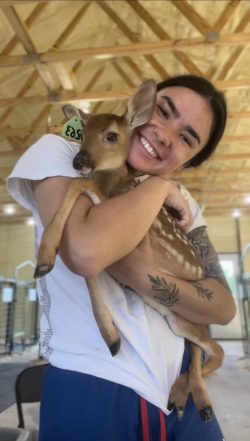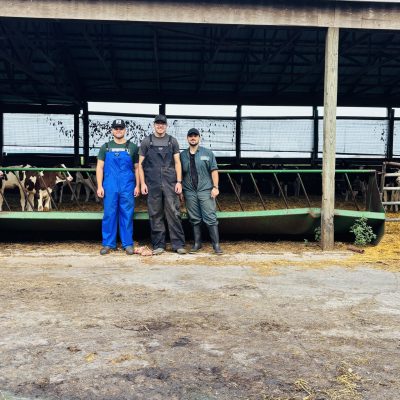Sydney St. Clair from MSU and Bryer Jones from Washington State University received the 2025 Food System Fellowship Program scholarships.
The Food System Fellowship Program (FSF) is a summer program held by the MSU College of Veterinary Medicine for veterinary students interested in food animal medicine. Through collaboration between the College and industry partners, students receive a hands-on experience that deepens their understanding of the food industry.
Participants, which are accepted from veterinary programs around the country, are placed in positions with industry partners or College faculty and complete a project that taps into the unique expertise available through the partnership.
“The students who participate are incredibly engaged and open to learning,” says Dr. Ángel Abuelo, professor of cattle health, MSU Red Cedar Distinguished Professor, and the head of FSF. “I always look forward to seeing the projects come to fruition. We hope to see them help meet the growing need for food animal veterinarians when they graduate.”
The MSU College of Veterinary Medicine has partnered with Merck Animal Health since 2006. In 2013, the company began to fund the FSF scholarships, which support outstanding students in their studies and advance the program’s goal of training excellent food animal veterinary professionals. This year, $20,000 was awarded in total, split between two students.
“We are proud to partner with the MSU College of Veterinary Medicine to provide these deserving and dedicated students with scholarships to further their education,” says Justin Welsh, DVM, executive director of livestock technical services at Merck. “Investments like this help develop the next generation of veterinarians who will advance animal health, strengthen food systems, and support agricultural communities.”
Meet the Scholarship Recipients
Sydney St. Clair
St. Clair is a third-year DVM student studying at MSU. She was curious about cervid (deer) medicine and wanted to explore that interest further through FSF.

“When I learned that the FSF program partnered with the Michigan Department of Agriculture and Rural Development (MDARD), I knew this would be a perfect fit for me to nurture my veterinary career interests while learning more about regulatory medicine, and the various state-level programs that protect animal health, support producers, and strengthen Michigan agriculture," says St. Clair.
Her project allowed her to work closely with a cervid program manager to outline a procedure for a privately owned cervid herd should any deer contract chronic wasting disease. This culminated in a presentation titled “Chronic Wasting Disease: Overview and Positive Herd Protocol,” which St. Clair delivered to herd owners and cervid industry professionals as part of FSF.
“This project was important to me because I wanted to create something that would directly impact herd owners in a positive manner,” says St. Clair.
She adds that she found FSF overall enlightening. “I traveled across Michigan to help conduct fair inspections, assisted in whole-herd cattle testing for tuberculosis, learned about emergency management, went to livestock auctions, spent time with the state veterinarian and other MDARD veterinarians and employees, and more. The experiences allowed me to see a possible future for myself in the industry.”
Bryer Jones
Jones is a second-year DVM student studying at Washington State University who applied to FSF following his interest in research.

“When I learned that I could complete my own project through FSF, I saw it as an opportunity to see a different side of veterinary medicine and an educational way to see if I wanted to pursue more research in my future,” says Jones.
During FSF, he researched the effects of needleless vaccination as compared to standard injected vaccinations for calves.
“I really appreciated that this project was hands-on and that I got to be the one to complete all of the steps, from writing the protocols to collecting field samples to actually performing the in-lab experiments,” says Jones.
“I am extremely appreciative of Dr. Abuelo’s guidance throughout the project,” Jones continues. “I am grateful for the opportunity to apply for the Merck Scholarship and that I was chosen as a recipient. FSF allowed me to get a better understanding of veterinary research and opened my eyes to potential future careers.”
